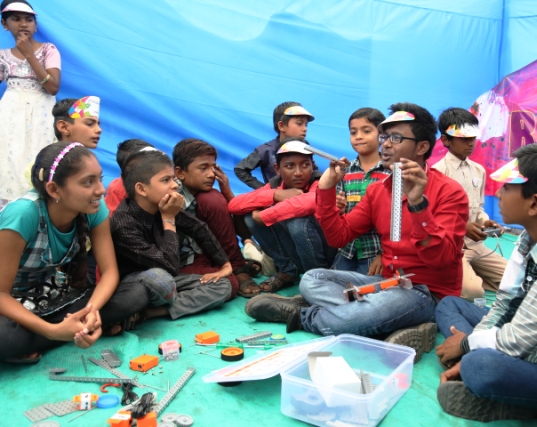Responsible businesses carry people along with them in their journey towards growth. Essar has generated business of more than USD 3bn through nurturing local entrepreneurs and has grown in unison with the communities around its presence.
Essar Foundation is the CSR arm of Essar, committed to fuelling development of communities around Essar’s business presence. “Our mission, as a thinking organization, is to continue on the path of creating deeply anchored, well-consulted, multi-collab initiatives that have a horizon set long enough to create deep impact. Towards that, our committed teams are courageous in setting progressive momentum in incredibly tough areas of rural India,” said Kaustubh Sonalkar, CEO, Essar Foundation.
Functional across more than 500 villages in eight states of India, the Foundation facilitates wide-ranging CSR initiatives in health, education, livelihoods, inclusion, women empowerment and skill development. The Foundation reaches out to over 5,00,000 individuals annually.
Initiatives in Women’s Empowerment
Gender inequalities are multidimensional and the goals of ‘gender equality’ and ‘women’s empowerment’ cannot be reduced to some single and universally agreed upon set of priorities. Thus the organization, from its Lok Vikas Kendras and Centres for Women’s Empowerment, is working on bridging the disparities for first-generation women entrepreneurs in Gujarat, Odisha and West Bengal, in opportunities for economic independence. This is giving them immense self-confidence to enter avenues and expand their horizons to the extent that they had once only dreamt of.
Initiatives in the Education Sector
Essar is working towards bringing out the best in the existing resources by working on enhancing the approaches in the education sector. The foundation’s initiative Indradhanush is setting higher benchmarks in child-friendly learning. Indradhanush is a well-planned strategic programme that brings real change in terms of embedding activity-based learning in the classroom. It has so far reached out to over 10,000 students and 500 teachers across States like West Bengal, Gujarat, and even Chhattisgarh.
Initiatives in Sanitation and Hygiene
Motilal Oswal Research Report 2016 states that less than 16% women use sanitary napkins in India. Of this, the percentage of women in rural areas using sanitary napkins is in single digits. Essar foundation’s initiative Sahaj is working towards addressing this issue by making low cost sanitary pads by local women of Palnar village in Kuakonda block, Dantewada district of Chhattisgarh. The initiative aims at creating awareness about menstrual hygiene education among adolescent young girls, and encourages self-employment among rural women.
This initiative has provided livelihood opportunity to more than 5 women associated with a local self-help group, ‘Maa Danteshwari’ and is gradually scaling up operations to link other women with this initiative. It has also ensured that clean and low-cost sanitary pads would now be available to rural women in the region at affordable prices.
Owing to the apprehension among women on adoption of sanitary napkins in the remote tribal area, the Foundation has also set up a team who allayed them after several rounds of counselling and discussions in schools, hostels etc.
For the near future, the foundation is increasingly focused around livelihood initiatives, especially around improved agriculture and skill development for youth and women. The push towards women’s empowerment through entrepreneurship and collective action via self-help groups will also remain in its strong areas.
The foundation will continue to focus on its collaborations with government programmes in the arena of quality healthcare accessibility for rural families, while persistently enhancing the existing health infrastructure in underserved regions. In education, Essar will invest in revolutionizing digital learning in schools, while promoting activity-based child-friendly teaching and learning processes. The foundation is working with local change-makers towards making villages open-defecation-free and encouraging positive hygiene behaviour to further intensify sanitation.
Initiatives in Health
The country is 81% short of specialists at rural community health centres (CHCs), and the private sector accounts for 63% of hospital beds, according to government health and family welfare statistics. In its endeavour to bring affordable, quality healthcare to India’s villages, Essar Foundation reaches out to the most underserved communities in states like Odisha and Chhattisgarh. Mobile health units, specialized health camps, large-scale eyecare drives, health ATM, upgrading health centre infrastructures, and regular preventive healthcare education through doctors and health workers are key features of what the team is doing diligently in these areas lacking basic facilities.
India stands second in the number of haemophilia patients in the world, according to the World Federation of Haemophilia (WFH). But sadly, most of them remain undetected and undiagnosed. Essar Foundation supported the New Civil Hospital in Surat in setting up Gujarat’s first Haemophilia Care Centre which is now a 24×7 hour facility. In this state-of-the-art facility, treatment is free of cost.
Dr Vijay Shah, professor, and Head of the Paediatrics and Haemophilia department at the hospital said, “We have treated more than 8,637 episodes of haemophilia in patients in past three years. When the clotting factor is less than one per cent, we consider the case severe, where the patient can bleed spontaneously. Patients come to us from various districts in Gujarat. We even had a patient from South Africa who was here for over a month. Thanks to Essar Foundation, we have the human resources and the software to maintain records of all patients. Going by the fact that patients are already in pain, they don’t have to wait in line for registration – they walk in here, we bring up their records and we start the treatment.”


